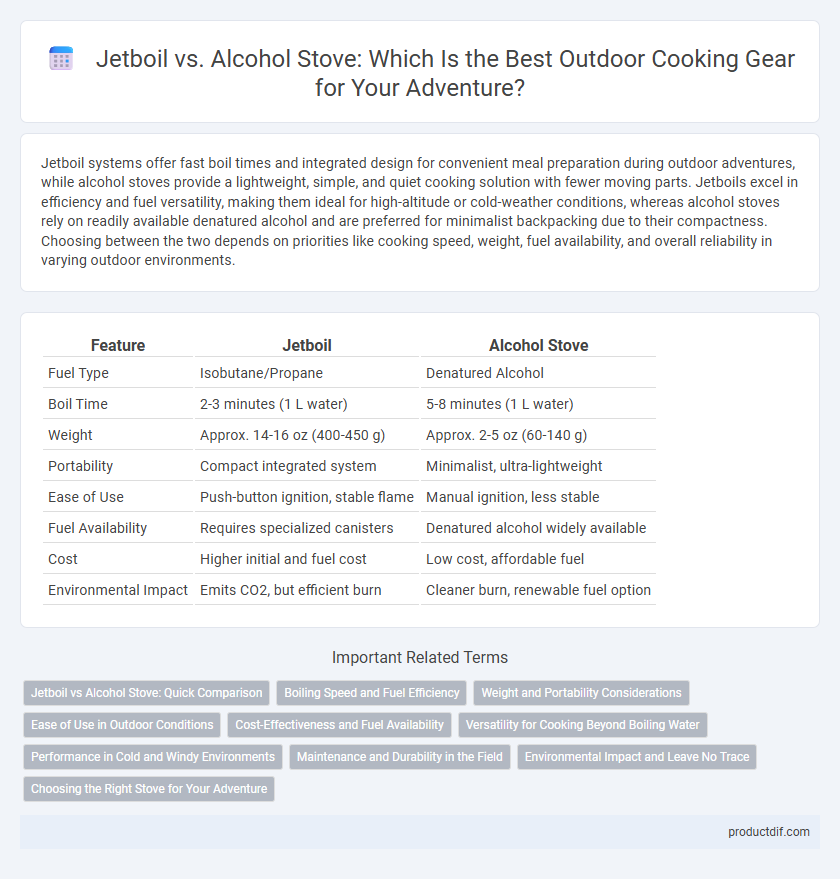Jetboil systems offer fast boil times and integrated design for convenient meal preparation during outdoor adventures, while alcohol stoves provide a lightweight, simple, and quiet cooking solution with fewer moving parts. Jetboils excel in efficiency and fuel versatility, making them ideal for high-altitude or cold-weather conditions, whereas alcohol stoves rely on readily available denatured alcohol and are preferred for minimalist backpacking due to their compactness. Choosing between the two depends on priorities like cooking speed, weight, fuel availability, and overall reliability in varying outdoor environments.
Table of Comparison
| Feature | Jetboil | Alcohol Stove |
|---|---|---|
| Fuel Type | Isobutane/Propane | Denatured Alcohol |
| Boil Time | 2-3 minutes (1 L water) | 5-8 minutes (1 L water) |
| Weight | Approx. 14-16 oz (400-450 g) | Approx. 2-5 oz (60-140 g) |
| Portability | Compact integrated system | Minimalist, ultra-lightweight |
| Ease of Use | Push-button ignition, stable flame | Manual ignition, less stable |
| Fuel Availability | Requires specialized canisters | Denatured alcohol widely available |
| Cost | Higher initial and fuel cost | Low cost, affordable fuel |
| Environmental Impact | Emits CO2, but efficient burn | Cleaner burn, renewable fuel option |
Jetboil vs Alcohol Stove: Quick Comparison
Jetboil systems offer rapid boil times of about 2 minutes and integrated ignition, making them highly efficient for precise fuel usage. Alcohol stoves utilize denatured alcohol, are lightweight, and simple with no moving parts, but typically take longer to boil water, around 6-8 minutes. Jetboil's trade-off includes higher cost and fuel cartridge dependency, whereas alcohol stoves excel in low-cost, lightweight backpacking with versatile fuel availability.
Boiling Speed and Fuel Efficiency
Jetboil systems provide superior boiling speed due to their integrated burner and insulated cooking cup design, typically bringing water to a boil in about two minutes. Alcohol stoves, while lightweight and simple, generally have slower boiling times, often requiring three to five minutes depending on conditions. Jetboil's fuel efficiency is enhanced by its focused heat transfer, consuming less fuel per boil compared to alcohol stoves, which burn cleaner but less efficiently due to open flame losses.
Weight and Portability Considerations
Jetboil systems typically weigh between 13 to 16 ounces, offering integrated fuel canisters and compact design for easy transport. Alcohol stoves, such as the popular Trangia models, often weigh as little as 3 to 5 ounces, making them significantly lighter but requiring separate fuel bottles that can add bulk. When prioritizing ultralight backpacking, alcohol stoves provide superior weight savings, while Jetboil's all-in-one portability appeals to those valuing convenience and quick setup.
Ease of Use in Outdoor Conditions
Jetboil systems offer superior ease of use in outdoor conditions with their integrated design, reliable ignition, and controlled flame, which allow for quick boiling times and minimal fuel handling. Alcohol stoves require more attention to lighting, flame control, and often need wind protection, making them less convenient in unpredictable weather or adverse environments. The convenience of Jetboil's push-button ignition and stable burner design significantly reduces user effort during camping or backpacking trips.
Cost-Effectiveness and Fuel Availability
Jetboil systems typically offer superior cost-effectiveness due to their rapid boiling times and integrated design, reducing fuel consumption during outdoor cooking. Alcohol stoves have the advantage of extremely affordable initial costs and widely available fuel sources, as denatured alcohol can be purchased in most regions and stored easily. Evaluating both options reveals Jetboil excels for efficiency and convenience, while alcohol stoves provide budget-friendly fuel access and minimal upfront expenses.
Versatility for Cooking Beyond Boiling Water
Jetboil systems offer precise flame control and quick boiling, making them ideal for simple meals and boiling water efficiently. Alcohol stoves provide greater versatility for cooking diverse meals, including simmering and frying, due to their adjustable heat output and open flame design. For campers seeking to prepare a wide range of dishes beyond just boiling water, alcohol stoves deliver enhanced cooking flexibility in various outdoor conditions.
Performance in Cold and Windy Environments
Jetboil stoves deliver superior performance in cold and windy conditions due to their integrated heat exchanger and wind-resistant design, enabling rapid boiling times and efficient fuel usage. Alcohol stoves, while lightweight and simple, struggle with heat output and longer boil times in adverse weather, making them less reliable in cold, windy environments. For outdoor enthusiasts prioritizing quick cooking and fuel efficiency in challenging climates, Jetboil offers a significant performance advantage.
Maintenance and Durability in the Field
Jetboil systems feature robust construction with sealed igniters and insulated components, reducing maintenance needs and enhancing durability in rugged outdoor conditions. Alcohol stoves, though simpler with fewer parts to maintain, require regular cleaning to prevent fuel residue buildup and may be more susceptible to damage from rough handling. Durability in the field favors Jetboil for consistent performance, while alcohol stoves offer lightweight reliability but demand cautious upkeep.
Environmental Impact and Leave No Trace
Jetboil stoves use pressurized fuel canisters that produce fewer emissions and minimize fuel spillage, making them a cleaner option compared to alcohol stoves, which burn denatured alcohol that can leave residue and produce higher carbon monoxide emissions. Alcohol stoves have the advantage of using biodegradable fuel but require more frequent refueling, increasing the risk of lingering fuel spills that can harm fragile ecosystems. Both options require careful use and proper disposal of fuel containers to adhere to Leave No Trace principles and minimize environmental impact in outdoor settings.
Choosing the Right Stove for Your Adventure
Jetboil stoves deliver rapid boil times and integrated design, making them ideal for fast-paced hiking and backpacking trips where efficiency matters. Alcohol stoves offer lightweight simplicity and fuel availability, perfect for ultralight adventurers seeking minimalism and reliability in remote areas. Selecting the right stove depends on balancing weight, fuel sources, and cooking speed to match your specific outdoor needs.
Jetboil vs Alcohol Stove Infographic

 productdif.com
productdif.com